For original equipment manufacturers, downtime is more than an inconvenience, it’s lost revenue, missed SLAs, and frustrated customers. In fact, manufacturers in the UK and Europe lose over £80 billion every year from unplanned equipment failures.
The bigger challenge isn’t spotting these problems. Everyone knows downtime is expensive. The real issue is preventing it before it happens. Most service teams are still stuck in a reactive loop: waiting for breakdowns, rushing parts, and patching problems under pressure.
That’s where AI field service software helps. Instead of reacting, OEMs can predict failures, guide technicians with real-time insights, and keep customers informed with accurate updates.
In this article, we’ll review the best AI field service software, so you can choose the right one for your business.
What Is AI Field Service Software?
AI field service software applies artificial intelligence to field service management, helping OEMs manage complex equipment and service networks more effectively. Instead of relying only on manual processes or static systems, it uses AI to give technicians real-time guidance, capture service knowledge automatically, and make critical information easy to access.
For OEMs, this means fewer delays, more accurate repairs, and service teams that can work proactively instead of reactively.
Best AI Field Service Software in 2026
Here are the top AI field service platforms to consider in 2026:
Makula – Best for Original Equipment Manufacturers (OEMs)
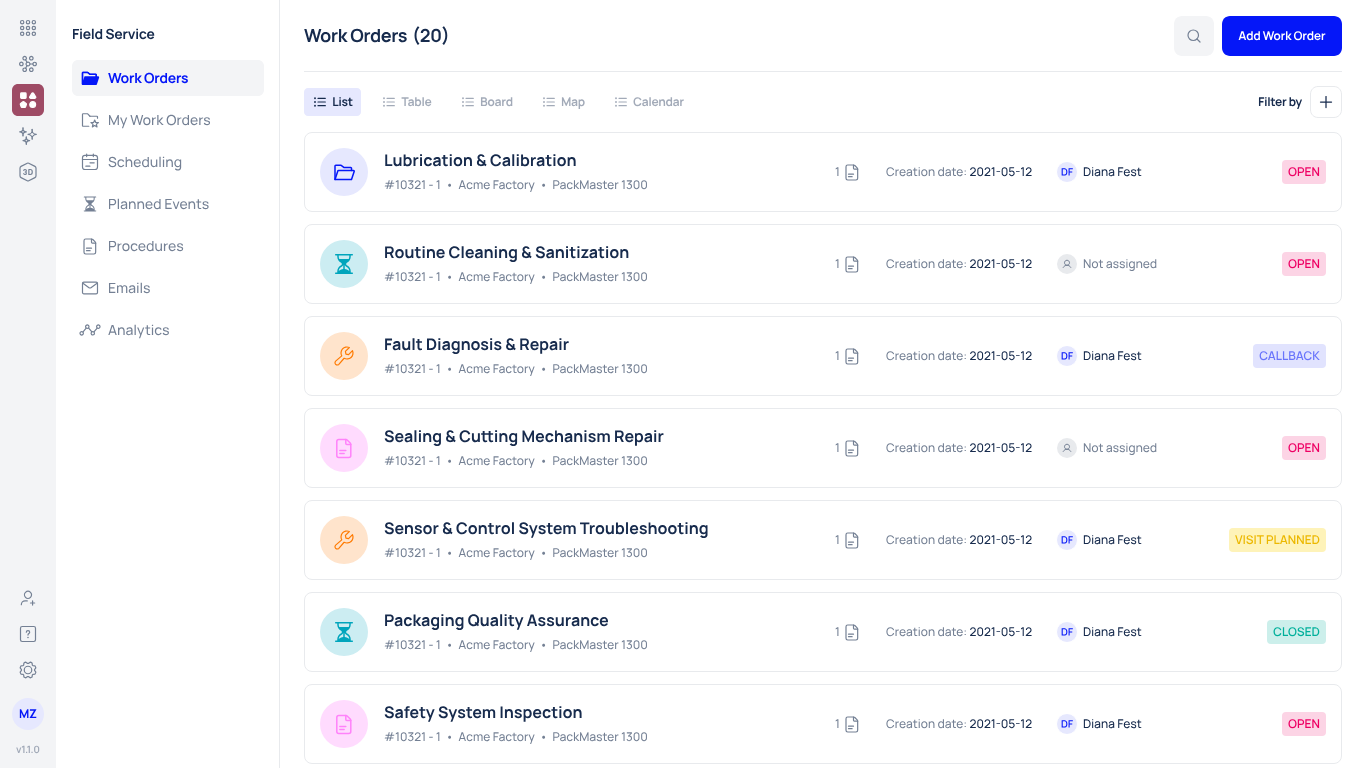
Makula is an AI-powered field service management software built for OEMs and asset-heavy service providers. Our software handles complex service environments with large installed bases and long equipment lifecycles.
With features like AI Copilot, AI Notetaker, and AI Search, Makula helps speed up jobs, reduce downtime, and keep service knowledge organized. It also includes an Asset Hub to track machines, a customer portal for clear updates, and visual tools for complex equipment.
Makula is modular and scalable, allowing companies to start with what they need and expand over time.
Let’s look at the features that make Makula a strong choice for industrial service teams:
AI Copilot for Comprehensive Field Service Assistance
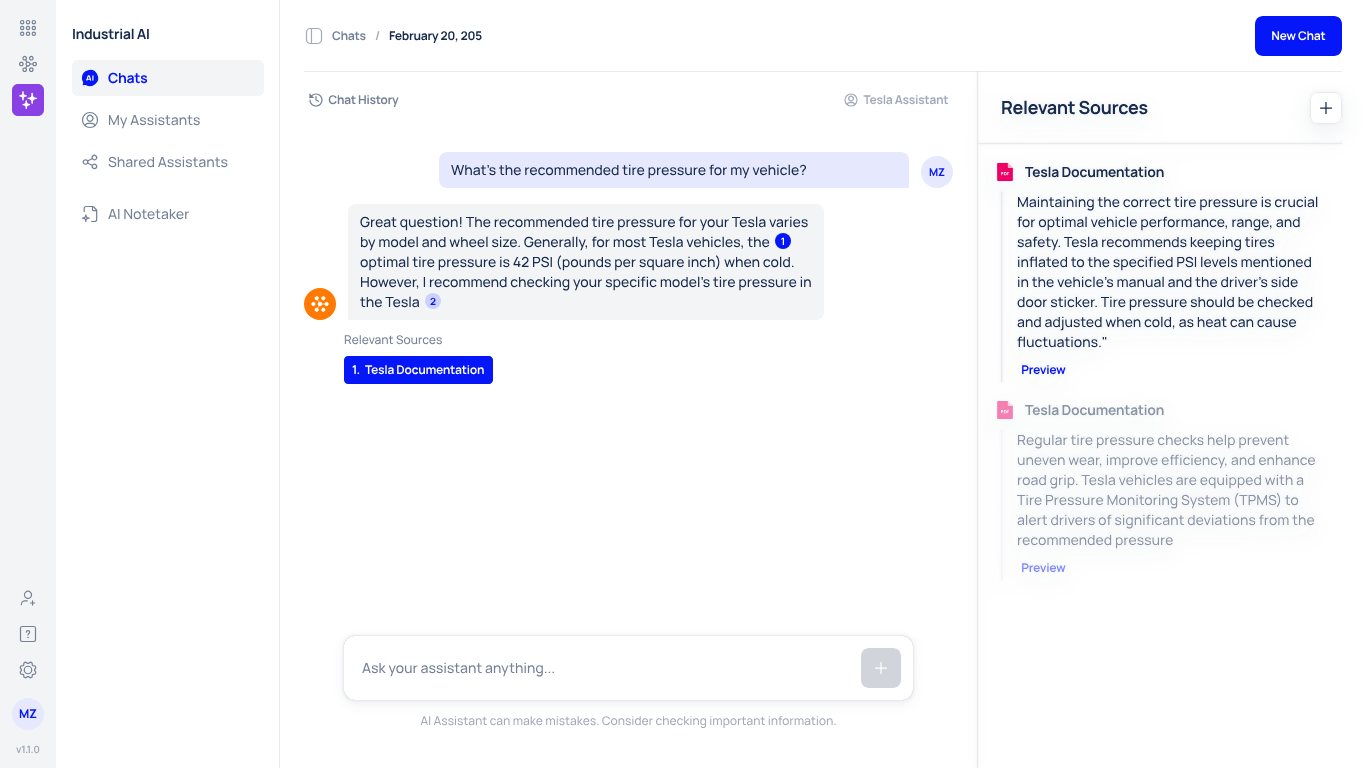
When technicians are out in the field, they have to make decisions fast with limited context.
Makula’s AI Copilot provides machine-aware assistance to technicians during the job. It sources information from service history, manuals, past faults, and technical documentation, so they don’t have to pause or search through files.
Here’s how it works:
- During diagnostics: A technician sees unusual vibration levels. The AI explains common causes for that model and recommends the next checks.
- During installations: A tech sets up a machine with a rare configuration. The Copilot shares the exact calibration procedure based on the serial number.
- For routine inspections: A missing label makes the asset ID unclear. The AI pulls history from location and usage to confirm the match.
- For documentation gaps: A model doesn’t have clear service notes. AI retrieves similar cases from the past year and shows what was done.
- During part replacement: The tech is unsure about compatibility. AI confirms which part version fits based on asset age and updates.
This level of support reduces downtime, increases accuracy, and helps teams complete tasks faster, even when working with unfamiliar assets.
AI Search for Instant Access to Service Knowledge
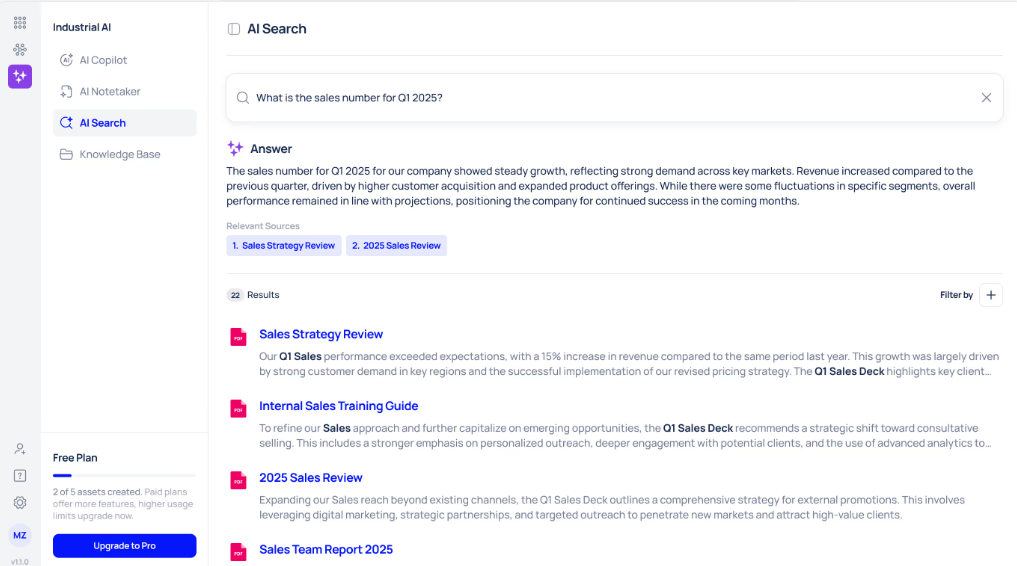
The hardest part of a field job is finding the right information. Technicians waste time clicking through shared drives, outdated manuals, or job notes just to confirm a part number or service step.
For example, a technician in the field might type, “What’s the torque setting for the drive motor on model X120?” Instead of scrolling through manuals or calling support, the system instantly pulls the answer from connected service documents, shows the exact source file, and highlights the relevant section.
The technician gets the information on-screen, with links to explore further if needed, and can move forward without delay. This saves time, reduces errors, and keeps service jobs on schedule.
AI Notetaker for Hands-Free Reporting and Summaries
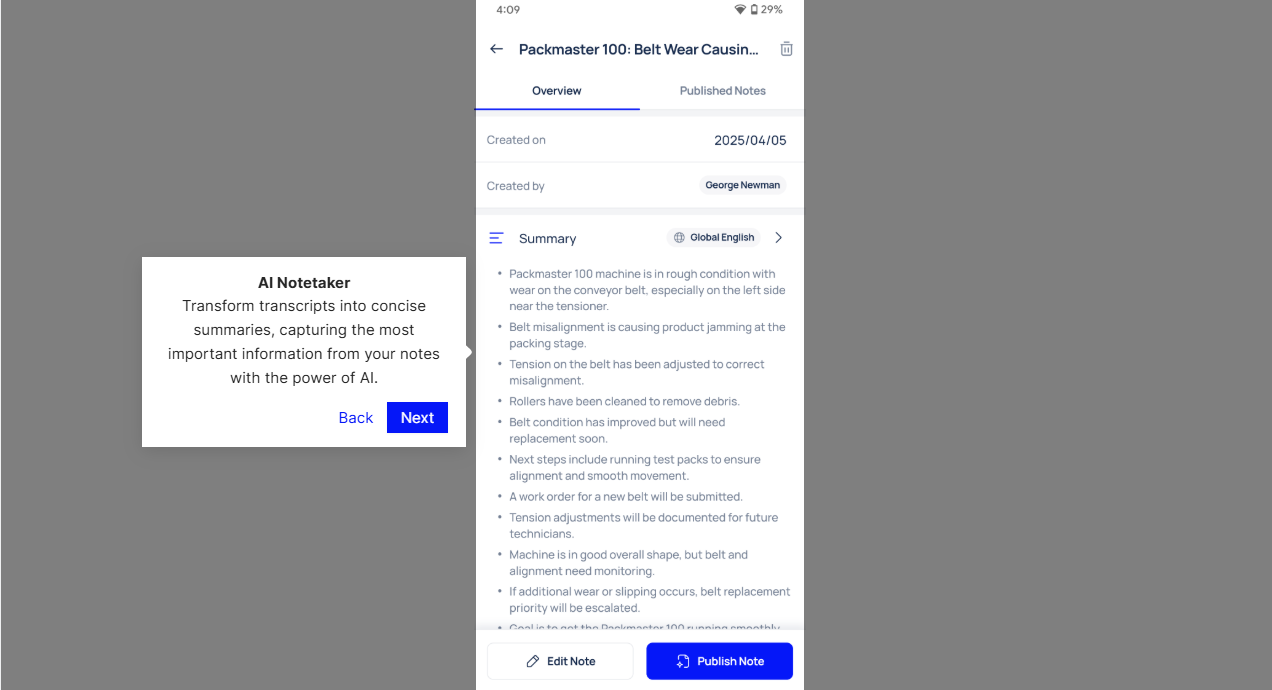
Technicians often wrap up a job but still spend time writing notes or updating job records later. When they’re busy, these reports can be rushed or missed entirely, leading to incomplete service history and delays in approvals or invoicing.
Makula’s AI Notetaker records technicians’ notes and converts them into structured job summaries automatically. It links everything to the correct asset and work order, so nothing is lost or left incomplete.
Here’s how it works:
- Voice capture button to record notes hands-free while still on-site
- Real-time transcription panel that converts speech into text instantly
- An AI summary view that condenses the transcript into bullet points
- Edit and publish buttons so techs can quickly review and send the summary
- Auto-linking that attaches each note to the correct job, asset, and timeline entry.
For example, at an automotive plant, a service technician uses Makula’s AI Notetaker while realigning a conveyor drive system. The tool records their spoken notes and generates a summary with timestamps and tasks, ready to publish into the work order before they leave the line.
Asset Hub with Installed Base Visibility for Smarter Maintenance
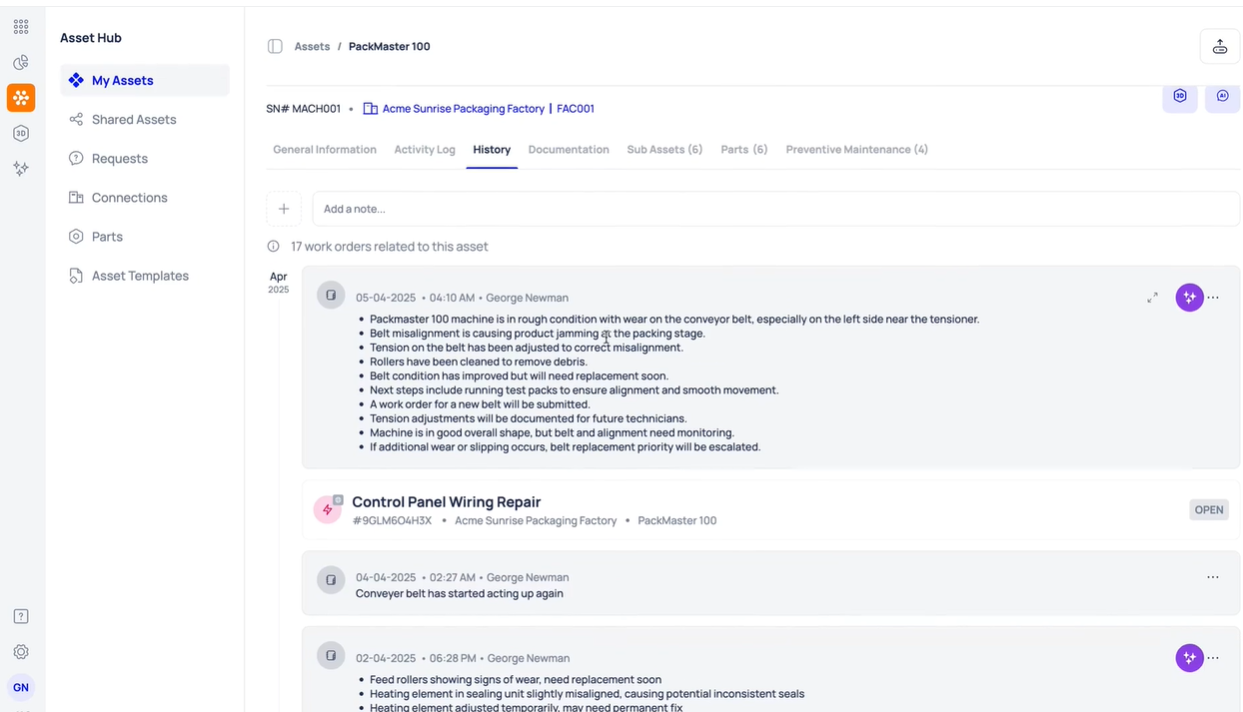
Without a clear view of installed machines, planners can’t see which assets are due for service, and technicians arrive on-site missing key context like usage hours, parts history, or recent faults.
Makula’s Asset Hub solves this by creating a single source of truth for all machines in the field. It brings profiles, history, and related resources together so every job can be planned with full context.
At Asset Hub, you’ll find:
- My Assets: See every machine you manage, with live status, service history, and location to plan upcoming tasks accurately.
- Shared Assets: Gain visibility into machines managed by partner teams, so work stays coordinated across sites.
- Requests: Collect service needs tied to specific assets, keeping planners informed about new or urgent jobs.
- Connections: Link each machine to its site, customer, and related systems, giving planners an operational context.
- Parts: Store all spare parts tied to each machine, so techs arrive with the right components on the first visit.
- Asset Templates: Standardize setup details like model, configuration, and service intervals so new assets can be added instantly and consistently.
Without a portal, customers call or email constantly just to access manuals, parts info, or open tickets, which slows internal teams and frustrates clients.
Customer Portal for Transparent Client Self-Service

Makula’s Customer Portal gives clients 24/7 self-service access via web or mobile, so they can view assets, submit service requests, and reorder spare parts without waiting for support.
Here’s how it helps:
- Machine documentation & service history: Customers view manuals, maintenance logs, and upcoming service events per asset.
- 3D spare-parts catalog: Visual 3D models help them find the right part faster and order it directly.
- Service & part request submission: Clients can log tickets or parts orders with asset context included.
- QR code access: Scan machines or equipment to launch the portal, view related info on-site.
- Branded portal experience: The portal can be styled with your branding and packaged with premium features to create recurring revenue streams.
For example, a machinery manufacturer gives its customers access to Makula’s customer portal so they can scan a machine in their factory, check its manuals and parts catalog in 3D, and submit a parts request directly.
3D Streams for Visual Collaboration on Complex Machinery
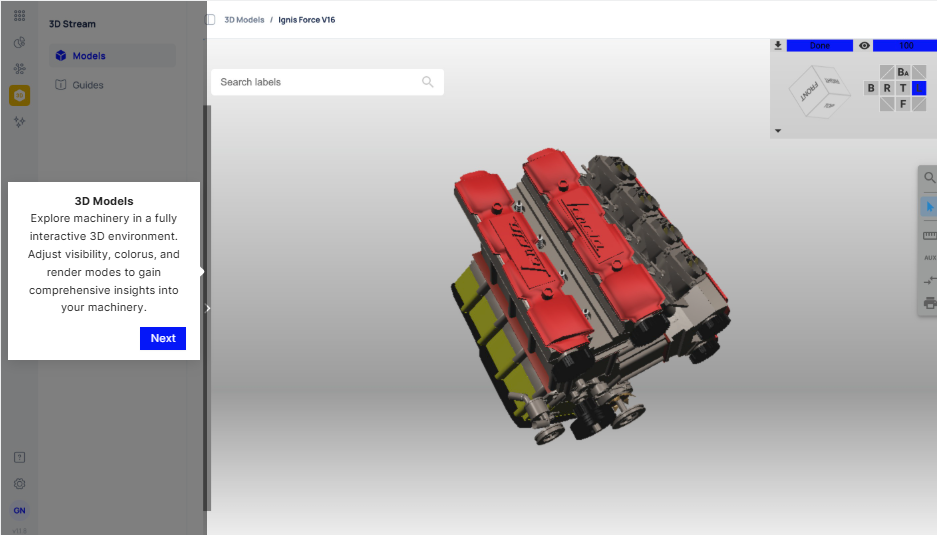
Most OEM machines are complex and highly customized, which makes it hard to explain issues through text or calls. Miscommunication between engineers, technicians, and customers slows down troubleshooting and leads to wrong part orders or repeated visits.
Makula’s 3D Streams brings collaboration directly onto 3D models of your machines, so everyone sees the same view and can work on it together in real time.
Here’s how it helps:
- Clear part tagging: Highlight and label components directly on the 3D model to avoid confusion.
- Live model collaboration: Let engineers, technicians, and customers annotate the same model in real time.
- Built-in visual guides: Attach manuals, checklists, and videos to parts to guide on-site work.
- Accurate part selection: Link 3D parts to part numbers and stock availability to prevent wrong orders.
- Service history overlay: Save comments, markups, and repair logs on the model for future reference.
- Instant spare-part ordering: Right-click any part and create a work order with its name and asset info prefilled.
- Visual design comparison: Use Three-Color Comparison to spot part variations or wear between similar models.
For example, if a robotics manufacturer wanted to support field technicians, engineers could highlight the faulty joint directly on a 3D model, link the correct replacement part, and guide the technician through the fix in real time.
Makula Pros and Cons
Pros:
- Asset-focused platform built for OEMs and complex machinery
- AI Copilot for real-time technician guidance and troubleshooting
- AI Notetaker for quick, hands-free reporting and summaries
- Mobile app with reliable offline support
- Centralized Asset Hub with full service history and parts visibility
- Customer portal for transparent updates and self-service access
- 3D visualization tools for collaboration on complex equipment
Cons:
- Steeper learning curve for teams new to AI-driven tools
Makula Reviews
Review #1: “The software is very user-friendly and intuitive to use. The team assists very intensively with the transformation process and onboarding. We have managed to integrate the tool into our daily processes, thereby promoting our internal coordination and ultimately our spare parts sales.”
Review #2: “The software has really developed very well, and Makula is doing a great job. The service is great, if I need something, there is always an answer from Karina very quickly.”
Makula Pricing
Makula pricing starts at €55 per user/month, with the final cost depending on users, modules, and integrations.
Salesforce Field Service
Best for: Enterprise field service teams needing AI scheduling and CRM integration
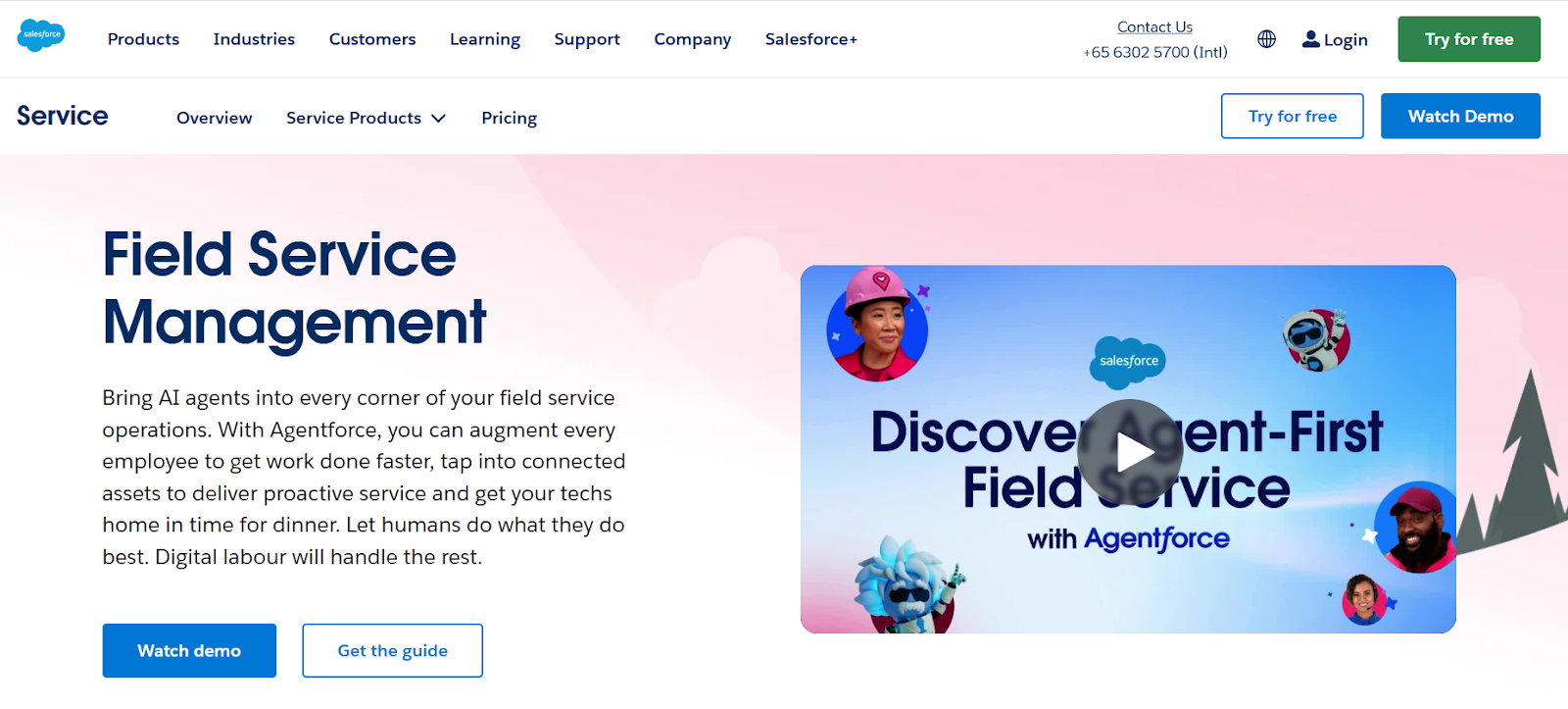
Salesforce Field Service brings AI-powered dispatch, scheduling, and route optimization into the Salesforce ecosystem. It gives managers real-time visibility into assets, technicians, and customer history. It also offers a mobile app.
Salesforce Field Service Key Features
- AI-driven scheduling and dispatch through Agentforce
- Mobile app with offline updates, signatures, and image capture
- Asset and parts visibility with full service history
- Route optimization and real-time analytics
- Regular updates, including AI assistance and mobile form enhancements
Salesforce Field Service Pricing
Starts at $175 per user/month (billed annually). Add-ons like Agentforce and advanced optimization increase cost.
ServiceMax
Best for: Industrial companies needing asset-centric service and predictive maintenance
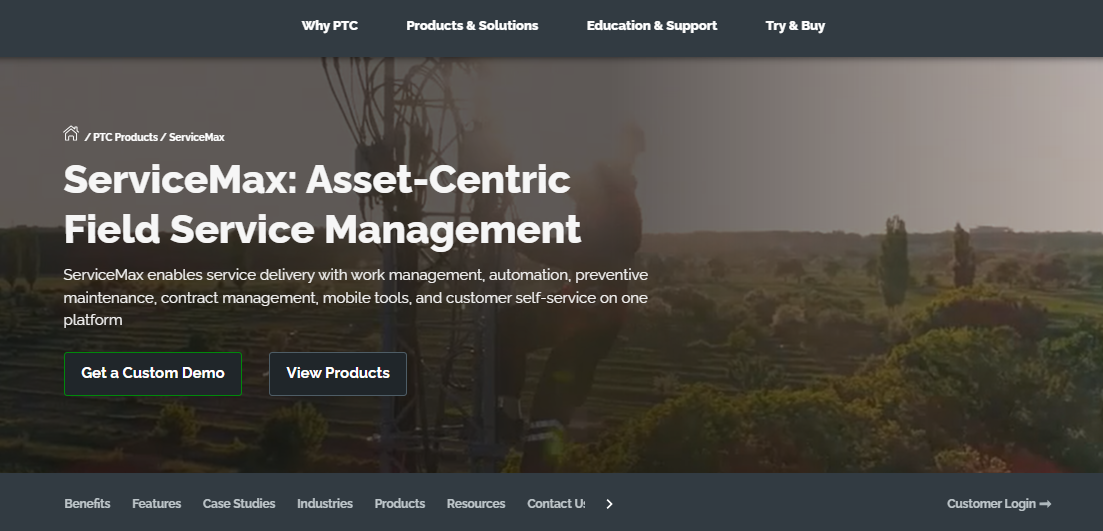
ServiceMax focuses on managing the full lifecycle of equipment with strong warranty and contract management, predictive maintenance, and mobile tools for technicians.
ServiceMax Key Features
- Asset visibility and lifecycle tracking with warranty support
- Scheduling and dispatch with predictive work-order triggers
- Mobile technician app with offline access
- Inventory and parts tracking with real-time analytics
- Contract and SLA management
ServiceMax Pricing
ServiceMax offers custom pricing. Contact their team for a quote.
Microsoft Dynamics 365 Field Service
Best for: Organizations already using Microsoft tools that need strong dispatch, scheduling, and AI-assisted field workflows
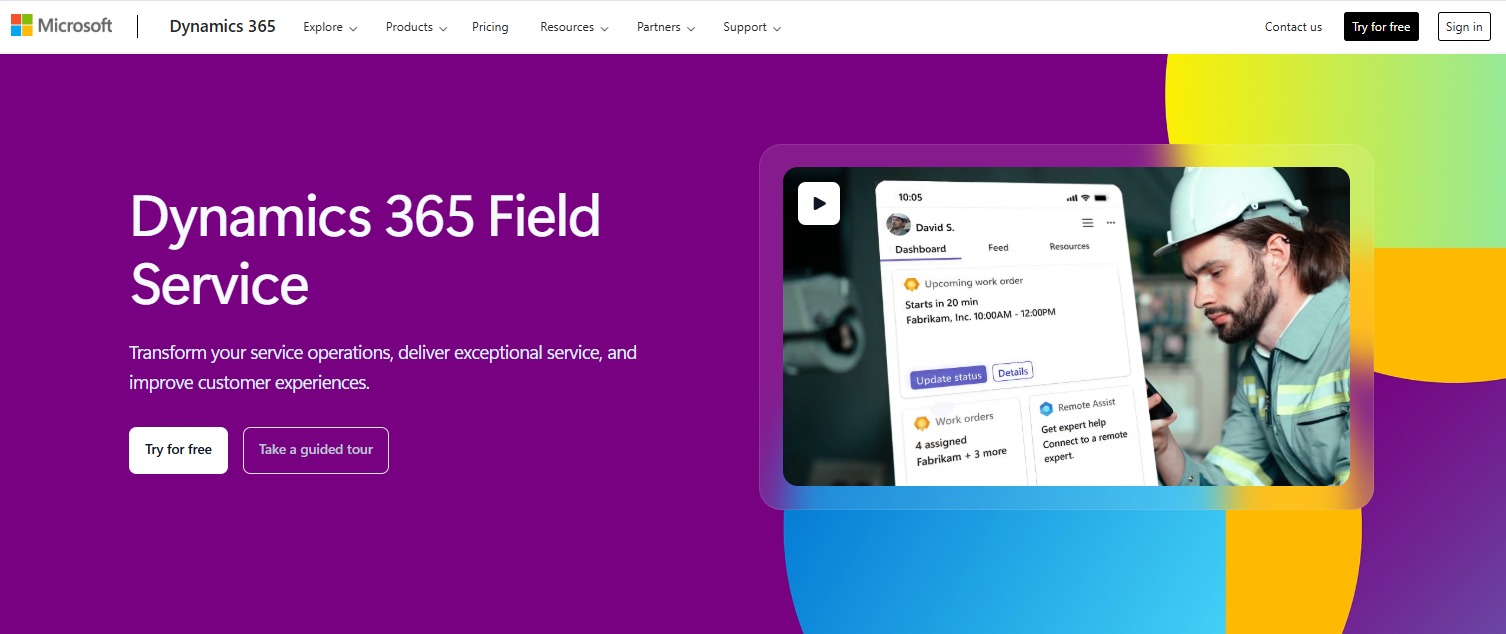
Microsoft Dynamics 365 Field Service combines work order automation, scheduling, asset tracking, and mobile apps to support on-site service. It includes Copilot features, which let users ask natural language questions, generate summaries, and use AI scheduling suggestions.
Dynamics 365 Field Service Key Features
- AI-powered scheduling and dispatch with Copilot support
- Offline-capable mobile app for technicians in the field
- Asset management with service history and maintenance
- Real-time communication tools for customers and teams
- Work order management with automated status updates
- Preventive maintenance planning with IoT integrations
- Reporting dashboards with service KPIs and analytics
Dynamics 365 Field Service Pricing
Microsoft Dynamics 365 Field Service starts at $105 per user/month (billed annually).
OverIT
Best for: Utilities, infrastructure, and enterprises with linear assets

OverIT provides end-to-end FSM solutions for enterprises managing complex networks of assets and large field teams.
The platform applies IoT, machine learning, and AI technologies to improve scheduling, collaboration, and efficiency across service organizations.
OverIT Key Features
- GIS-powered map view & network asset visibility
- Optimized scheduling & dispatch with ML and rules
- Offline-capable mobile app with multimedia debriefing
- Field collaboration, including AR / remote expert support
- Asset maintenance & IoT integration for linear assets
OverIT Pricing
OverIT offers custom pricing. Contact their team for details.
IFS Field Service Management
Best for: Asset-heavy industries that need complete lifecycle service management
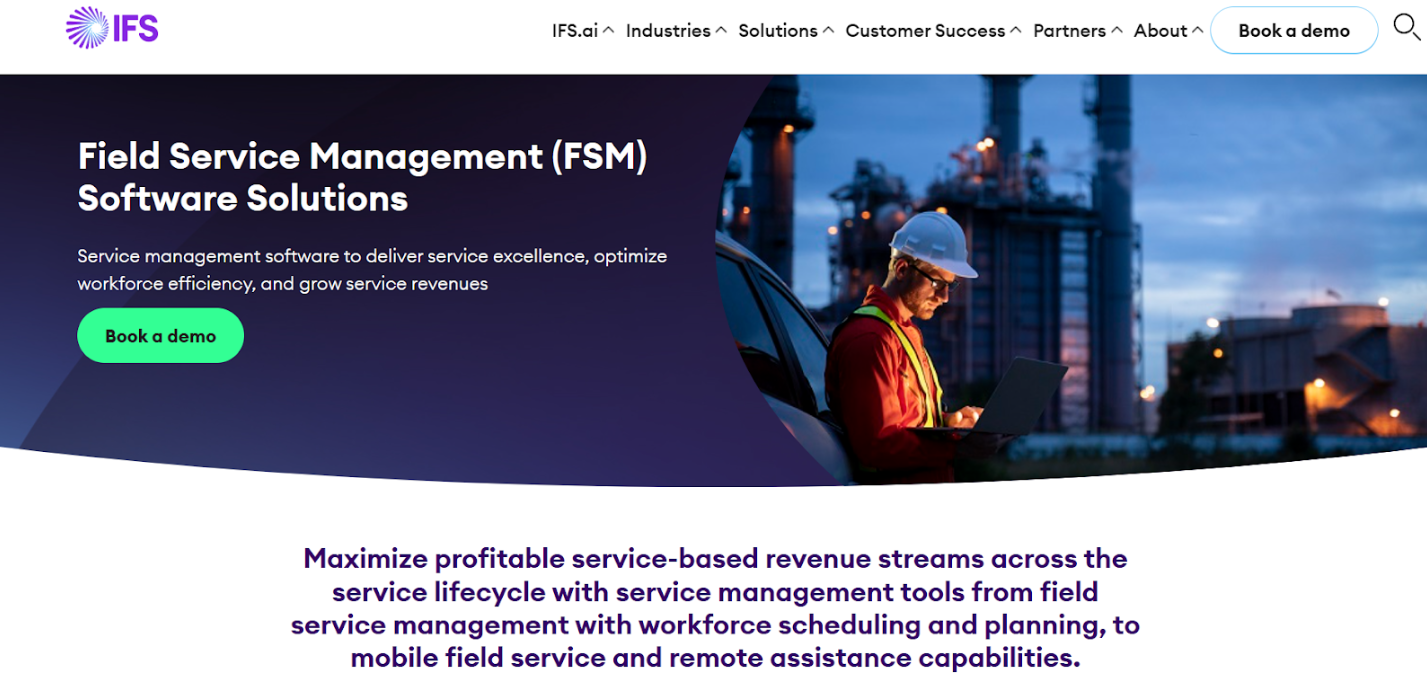
IFS Field Service Management brings together scheduling, work orders, contracts, warranties, spare parts, SLA tracking, and reverse logistics in a unified platform.
The system can be deployed in the cloud or on-premises and leverages AI and IoT to boost technician efficiency. It is designed for organizations with widely distributed assets and high service expectations, helping teams coordinate more effectively and deliver consistent results.
IFS Field Service Management Key Features
- AI-driven scheduling and dispatch optimization
- Centralized management of work orders, contracts, and warranties
- Parts usage tracking with depot repair support
- Mobile access for field staff with offline capability
- Real-time SLA monitoring with performance dashboards
- Flexible deployment options: cloud or on-premise
- Remote assistance tools for quicker problem resolution
IFS Field Service Management Pricing
Pricing starts at $65 per user/month. Contact IFS for a custom quote.
Zinier
Best for: Flexible and low-code AI service automation
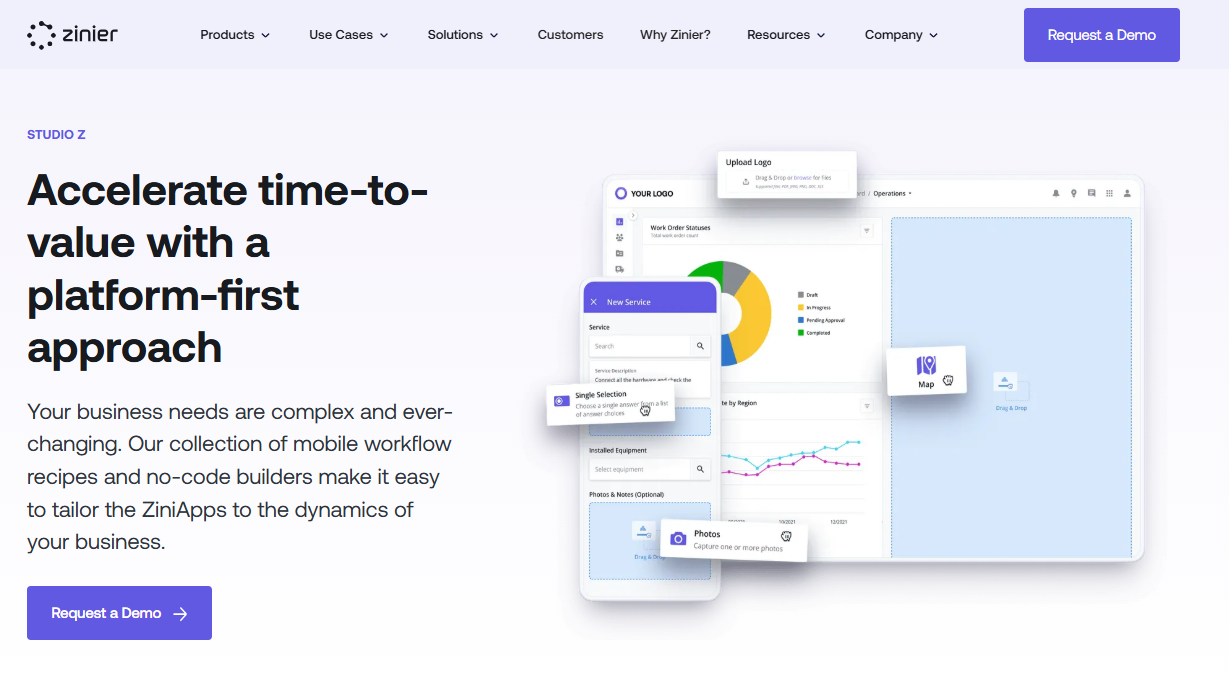
Zinier is an AI-first field service management platform built around workflow automation and low-code customization.
It allows service teams to configure processes, automate repetitive tasks, and adapt quickly as business needs change. With a strong focus on AI-driven workflows, Zinier helps reduce manual effort while improving technician productivity and service delivery.
Zinier Key Features
- AI-powered automation for scheduling and workflows
- Low-code tools to customize processes quickly
- Mobile app for technicians with offline capability
- Integration with enterprise systems through APIs
- Real-time visibility into service jobs and performance
- Configurable dashboards to track service outcomes
Zinier Pricing
Zinier offers custom pricing. Contact their team for a quote.
Comparison Table: 7 Best AI Field Service Software to Consider in 2026
How to Choose an AI Field Service Software for Your Business
When comparing AI field service platforms, it’s easy to get lost in the details of feature lists.
Here’s how to evaluate them step by step so you can pick the right fit for your business:
AI Maturity
Many platforms advertise AI but only deliver simple automation, like auto-scheduling or form filling. Stronger solutions go beyond that, helping technicians in the field with real-time guidance, knowledge capture, and instant access to service history.
When evaluating options, ask vendors to show how their AI tools actually support technicians on the job. Makula stands out here by combining features like AI Copilot, AI Notetaker, and AI Search, which actively guide field teams and keep service knowledge organized.
Industry Alignment
Generic field service platforms serve trades well, but OEMs need software that can manage complex machines, warranty requirements, and multi-region installed bases.
A good test is to see how the system handles long asset histories and contract obligations.
Mobile and Offline Capability
Service happens in places with poor connectivity, such as factories, mines, or remote construction sites.
A reliable platform should allow technicians to see job details, manuals, and checklists offline, then sync automatically once they’re back online. Makula addresses this with an offline-ready mobile app that keeps technicians productive in remote environments.
Data Integration
AI is only as good as the data behind it. The right system connects asset records, service history, parts, and customer data in one place.
If integration is weak, technicians will still struggle to get the full picture in the field. When evaluating vendors, check how easily their platform links to your ERP or CRM.
Scalability and ROI
Your service operations will grow with more assets, more technicians, and more regions to manage. The right platform should scale with you and provide clear visibility into ROI, like reduced downtime, higher first-time fix rates, and lower travel costs.
With Makula, OEMs can start with core scheduling and dispatch, then add AI modules, asset hubs, or customer portals as their service network scales.
Check your ROI here.
Bottom Line: Makula is the Best AI Field Service Software for OEMs
For OEMs managing complex equipment, strict SLAs, and rising customer expectations, generic service tools don’t go far enough. Without AI, teams stay stuck reacting to breakdowns instead of preventing them. Every hour of downtime strains both costs and customer trust.
While several vendors offer AI features, few are designed specifically for OEM complexity. Makula stands out, with AI tools, asset visibility, and offline-ready mobile.
Book a demo to see how Makula helps OEMs cut downtime and improve service performance with AI.



.webp)

